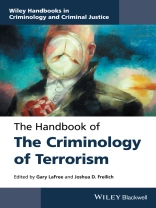The Handbook of the Criminology of Terrorism features a collection of essays that represent the most recent criminological research relating to the origins and evolution of, along with responses to, terrorism, from a criminological perspective.
- Offers an authoritative overview of the latest criminological research into the causes of and responses to terrorism in today’s world
- Covers broad themes that include terrorism’s origins, theories, methodologies, types, relationship to other forms of crime, terrorism and the criminal justice system, ways to counter terrorism, and more
- Features original contributions from a group of international experts in the field
- Provides unique insights into the field through an exclusive focus on criminological conceptual frameworks and empirical studies that engage terrorism and responses to it
Tabella dei contenuti
Notes on Contributors viii
Part I Introduction 1
Bringing Criminology into the Study of Terrorism 3
Gary La Free and Joshua D. Freilich
Part II Etiology 15
1 The Etiology of Radicalization 17
Randy Borum
2 Psychological Factors in Radicalization: A “3 N” Approach 33
David Webber and Arie W. Kruglanski
3 What Makes Them Do It? Individual‐Level Indicators of Extremist Outcomes 47
John P. Sawyer and Justin Hienz
4 The Terrorists’ Planning Cycle: Patterns of Pre‐incident Behavior 62
Brent L. Smith, Paxton Roberts, and Kelly R. Damphousse
5 Group‐level Predictors of Political and Religiously Motivated Violence 77
Katharine A. Boyd
6 Country‐level Predictors of Terrorism 93
Nancy A. Morris and Gary La Free
Part III Theories 119
7 General Strain Theory and Terrorism 121
Robert Agnew
8 Social Learning Theory and Becoming a Terrorist: New Challenges for a General Theory 133
J. Keith Akins and L. Thomas Winfree, Jr.
9 The Situational Approach to Terrorism 150
Henda Y. Hsu and Graeme R. Newman
10 Victimization Theories and Terrorism 162
William S. Parkin
11 Analyzing Radicalization and Terrorism: A Situational Action Theory 175
Per‐Olof H. Wikström and Noémie Bouhana
Part IV Research Methods 187
12 Measuring Terrorism 189
Laura Dugan and Michael Distler
13 Paradigmatic Case Studies and Prison Ethnography: Future Directions in Terrorism Research 206
Mark S. Hamm and Ramón Spaaij
14 Social Network Analysis and Terrorism 221
Aili Malm, Rebecca Nash, and Ramin Moghadam
15 Spatial and Temporal Analysis of Terrorism and Insurgency 232
Shane D. Johnson and Alex Braithwaite
16 Applying Multilevel Models to Terrorism Research 244
Brian D. Johnson
17 Methodological Advances in the Study of Terrorism: Using Latent Class Growth Analysis to Estimate Terrorism Trends 260
Nancy A. Morris
18 Interrupted Time Series Analysis in the Study of Terrorism 276
Robert Apel and Henda Y. Hsu
Part V Types of Terrorism 295
19 Far Right Terrorism in the United States 297
Pete Simi and Bryan F. Bubolz
20 Left‐wing Terrorism: From Anarchists to the Radical Environmental Movement and Back 310
Jennifer Varriale Carson
21 Assessing Aerial Hijacking as a Terrorist Tactic 323
Susan Fahey
22 Evolution of Suicide Attacks 339
Ami Pedahzur and Susanne Martin
23 Terrorist Assassinations: A Criminological Perspective 353
Marissa Mandala
Part VI Terrorism and Other Types of Crime 371
24 Organized Crime and Terrorism 373
Enrique Desmond Arias and Nazia Hussain
25 Similar from a Distance: A Comparison of Terrorism and Hate Crime 385
Ryan D. King, Laura M. De Marco, and Robert J. Vanden Berg
26 Studying Extremist Homicide in the United States 402
Jeff Gruenewald and Brent R. Klein
27 Financial Terror: Financial Crime Schemes Involving Extremists Linked to the American Far Right and al‐Qaeda and Affiliated Movements 420
Brandon A. Sullivan, Joshua D. Freilich, and Steven M. Chermak
28 An Empirical Analysis of Maritime Terrorism Using the Global Terrorism Database 433
Bo Jiang
Part VII Countering Terrorism 449
29 Empowering Communities to Prevent Violent Extremism: A Report on the August 2014 National Summit 451
Stevan Weine and William Braniff
30 Terrorist Plots the United States: What We have Really Faced, and How We Might Best Defend Against It 468
Kevin J. Strom, John S. Hollywood, and Mark W. Pope
31 The Ten Commandments for Effective Counterterrorism 482
Simon Perry, David Weisburd, and Badi Hasisi
32 Prosecuting Terrorism post‐9/11: Impact of Policy Changes on Case Outcomes 495
Christopher A. Shields, Brent L. Smith, and Kelly R. Damphousse
33 Prisons: Their Role in Creating and Containing Terrorists 508
Margaret A. Zahn
34 The Individual Risk Assessment of Terrorism: Recent Developments 520
John Monahan
35 Legislative Efforts to Prevent Eco‐terrorist Attacks 535
Yi‐Yuan Su and Sue‐Ming Yang
36 On the Relevance of Cyber Criminological Research in the Design of Policies and Sophisticated Security Solutions against Cyberterrorism Events 553
David Maimon and Alexander Testa
Index 568
Circa l’autore
Gary La Free is Director of the National Consortium for the Study of Terrorism and Responses to Terrorism (START) and a Distinguished Scholar and Professor of Criminology and Criminal Justice at the University of Maryland. His most recent book (with Laura Dugan and Erin Miller) is Putting Terrorism in Context (2015).
Joshua D. Freilich is a member of the Criminal Justice Department and the Criminal Justice Ph D Program at John Jay College. He is the Creator and co-Director of the United States Extremist Crime Database (ECDB), an open source relational database of violent and financial crimes committed by political extremists in the U.S.












